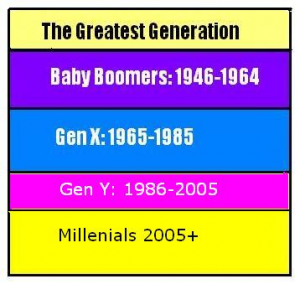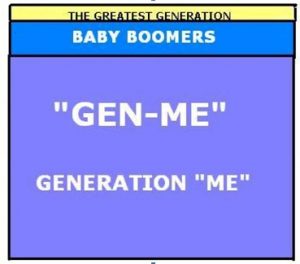Defining the Square
Defining the Square
Have you ever heard the phrase “think outside of the box”? I realize that it’s a cliché to say, “Think outside of the box” but there I said it.
Note to reader: as soon as you say the words, “Think outside of the box,” someone else will invariably pipe up and ask, “How did you get yourself into the box in the first place?”
So let’s get one thing straight: the title of this book is “Think Outside The Square.”
A square is “a plane figure having four equal sides and four right angles.” The term square can refer to an “old-fashioned” person too. Think back to the days of Austin PowersThe people who were not hip back then were called “squares.”
“ Don’t be such a square, baby,” as Austin Powers might say. (As an Austin Powers super fan, I truly appreciate the reference. It brings a good amount of comic relief.)
So when we talk about first defining the square, I want you to think about people. In particular: I want you to consider the values and beliefs of the average customer nowadays. Have you ever considered who is the average customer these days? What is his or her focus? What values does this buyer hold dear? What is her inner mantra? Does he believe that respect to others is important?
When we talk about selling it’s helpful to define your customer first before guessing about them or what they might want. Then, once we know their motivation or the motivation of the decision maker of their company we can figure out how to best market to them.
So in this book, I now hereby declare that every person in America is a square.
All the squares can fit inside of one big generational square.

Here’s what I mean. Let’s arrange every person in America living today by his or her date of birth. When we do this, the top part of the square comprises The Greatest Generation. These folks were born prior to 1946. The next square would be for people born from 1946-1966 commonly known as the Baby-boomers. The next square would be for those folks born from 1966 – 1986, often called Generation X and then comes Generation Y and our final square represents the Millenials. (those born after 2005). So we all fit into one of these squares – though admittedly, they do look more like rectangles.
Please note: these terms and birth-dates are NOT chiseled in stone yet, and social researchers will get into lively arguments about this stuff.
But this is my book and I subscribe to the KISS principle, (Keep it Simple, Sweetie). therefore I hereby proclaim that there are really only three major generations:
The Greatest Generation, Baby Boomers and Generation Me. ( Generation Me will include all these other groups Gen X, Gen Y and Millennials).

Once I make this change, you may realize that Baby Boomers and The Greatest Generation have shrunk in size. Baby Boomers, for example, are no longer the biggest marketing target on earth. (Unless, that is you sell life insurance and retirement planning.).
In fact, Baby Boomers and the greatest generations are now “over the hill” to many advertisers because the folks in these squares will be retiring soon or have already retired or they are living in convalescent homes. Retired people often live on fixed incomes and are not known for spending money frivolously.
The biggest square belongs to Generation Me, and so this is what I mean by “defining the square.” Many salespeople and politicians fail to realize that the target may have changed. Unless, of course you specifically target older people.
Therefore, in order to know how to better sell to Generation Me, we need to know a little bit more about them. So let’s dig in to learn what they are about. By the way, I didn’t come up with this Gen Me idea. Dr. Jean M. Twenge from San Diego State University did. (You should keep all fonts and font sizes consistent)
In her book, Generation Me, author Jean M. Twenge used scientific research to study people born after 1968 to the ones that came before it. Twenge compiled data collected in questionnaires filled out in the 1950s, 1960s, and 1970s and compared them. She noticed how the results and attitudes of people born in the 1980’s and 1990’s were much different which allowed her to arrive at her thesis statement about personalities and attitudes of “Gen Me”. Here are some of her interesting findings. Allow me to share them with you.
What to Know About Generation Me
Gen Me is an entitled group who has been told from the time they could crawl, “If you believe in yourself, then you can achieve anything.”
The Gen Me mantra is, “You are special; you are important; being different is good; you first must love yourself before you love others.”
Gen Me believes people should respect themselves first, more than respecting social rules.
The personality traits of these Gen mes emphasizes a high degree of individualism.
Generation Me Beliefs about the World
Don’t feel restricted by rules. Don’t conform.
Be honest to the other person, even if the truth hurts the other person.
There are no dress codes in life so wear tennis shoes and sandals and odd clothing where ever and whenever you want – even to the White House.
Tattoos, body art, and piercing are a form of Gen Me self-expression. “The individual has always come first and feeling good about oneself is a primary virtue.”
According to Twenge (who is a member of Gen Me herself) “We speak the language of “the self” as our native tongue. So much of the ‘common sense’ advice that’s given includes variations on the “self”. Examples:
- Worried about being in a social situation? Be yourself.
- Concerned about your performance? Believe in yourself
- Should you get the nose ring? Yes, express yourself.
- Want to get married? You have to love yourself first before you can love someone else.
- Should you express your own opinion? Yes, express yourself.
(Very good way to illustrate your point)

What Gen Me’s Value
Self-image is very important to Generation Me. They have been raised watching TV, videos, dvds, and even YouTube. They have been photographed and videotaped by parents, friends, and relatives. They know the importance of looking good on camera in case they make it big one day.
Many think they will be rich and famous – just because they believe it.
Nose jobs, breast implants, face-lifts, Botox, eyebrow waxing, going to the gym often
Looking good = feeling good = that makes us happy.
Many Gen Mes have an extended adolescence –they don’t want to grow up.
Many Gen Mes have come from divorced households.
Many secretly crave success and fame quickly.
Many just crave stability and a father figure.
Generalized Religious Values
Many of the churches that have grown in membership promote a personalized form of religion with a strong Father figure. Example, Rick Warren of The Purpose Driven Life writes, “Accept yourself. Our Father (God) accepts us unconditionally.”
Personal faith guarantees acceptance into heaven, so even if you’re a murderer, you will be saved if Jesus is your lord and savior.
Generalized Personality Traits
Gen Mes were weaned on television and TV ads are usually very visual.
They consider themselves individuals and fear groupthink – zombies.
They are computer literate and therefore like things fast and easy.
They hate to wait.
They are highly materialistic yet have unrealistic expectations.
Many Gen mes have never lived in a world where video games, cell phones, Internet, emails and texting did not exist.
Generalized Feelings of Gen Me
Gen Mes worry – half have seen their parents divorce, or don’t know their father
Worry about relationships, use online dating services, so they marry later in life
Often feel anger, sadness, pain, confusion and uncertainty with family issues
Some have a victim mentality – make excuses when things don’t go my way
Blame everyone else for their own failures
I am not at fault, someone else did it or made me do it.
Loneliness is the flip side of self-freedom and only putting yourself first.
Gen mes lack a feeling of community so they will create one
Politics
Politicians can’t be trusted: look at Iran Contra, Clinton-Lewinski, and the search for weapons of mass destruction in Iraq
How can this politician best help me?
What Knowing About a Gen Me Person Means to Salespeople
Some marketers have already figured that self is important to Gen mes and market in this direction. Prudential Life Insurance, for example, used to have a motto: “Get a piece of the rock.” It now has a more individualistic motto: “Be Your Own Rock.”
What about the Army’s motto: “Be all you can be” or an “Army of One.”
TV, emails and social media are all a good way to capture Gen mes attention.
Rhymes are popular.
Individualized music appeals to them.
Gen mes may have unrealistic expectations about entry level salaries and place more emphasis on money, fame, and image.
From Wikipedia and other Internet Sources
Generation Me has survived a hurried childhood of divorce, latchkeys, space shuttle explosions (primarily in the United States), open classrooms, widespread political corruption, inflation and recession, devil-child movies, and a shift from “G” to “R” ratings.
Gen mes date cautiously.
Divorce rates grew, however significant alternatives to traditional marriage (from remaining single to same-sex couples to merely “living together”) also arose.
Technology-wise the ‘creation’ and spreading of the internet rendered face-to-face communication secondary, books beside the point, near-infinite knowledge on hand 24/7 and tech-related jobs a hot commodity
In jobs, they embrace risk and prefer free agency to loyal corporatism. Politically, they lean toward pragmatism and nonaffiliation and libertarianism. Sometimes criticized as “slackers”, they nevertheless were widely credited with a new growth of entrepreneurship and the resulting dot-com boom. (Look very closely…do you see that gray highlighting? That comes from copying & pasting from a webpage. Be sure to get rid of that)
Gen mes just love stuff. They love celebrities. They love technology. They love brand names. . . . They’re happy to do whatever advertising tells them to do. So what if they can’t manage to read anything longer than an instant message?”
“Not true. We grew up with courses that dissect the media and advertising, so I think we’re even more aware of what’s going on.”
Final Thoughts About Gen Me:
Not every Gen Me person has several tattoos and a body piercing, or comes from a divorced family so this is a very generalized view of things. If you belong to Generation Me or are a Gen Me salesperson you are free to totally disagree with this assessment.
In addition, nowadays things change quickly too. On the Internet, what exists today will probably exist differently tomorrow.
Rather than argue about it, let’s say that Generation Me’s ways are often random, ambiguous, and contradictory.